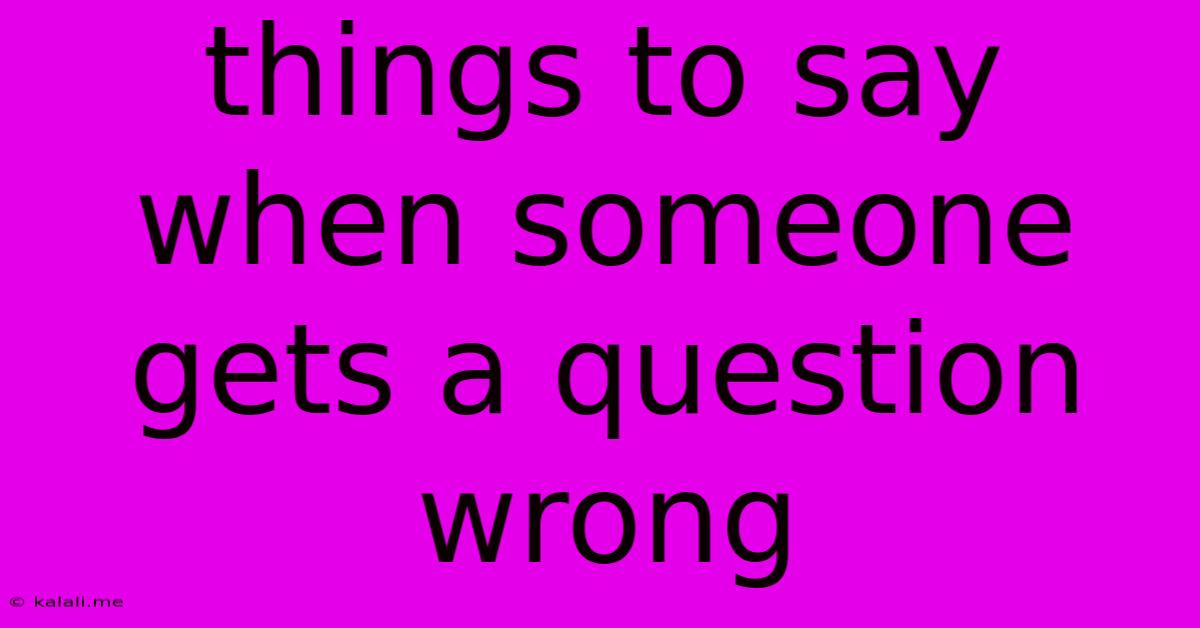Things To Say When Someone Gets A Question Wrong
Kalali
Jun 07, 2025 · 3 min read

Table of Contents
Things to Say When Someone Gets a Question Wrong: A Guide to Supportive and Constructive Feedback
Getting a question wrong can be disheartening, especially in situations like exams, interviews, or even casual quizzes. How you respond to someone's incorrect answer is crucial; it can either boost their confidence or discourage further learning. This article explores various phrases and approaches to offer constructive feedback when someone answers incorrectly, focusing on empathy, encouragement, and positive reinforcement. This guide helps you navigate these sensitive situations while fostering a supportive and encouraging environment.
Why Choosing Your Words Carefully Matters
The way you respond significantly impacts the individual's learning process and overall morale. A harsh or dismissive response can damage their self-esteem and hinder future learning. Conversely, a supportive and encouraging approach can foster a growth mindset and motivate them to try again. Therefore, carefully crafting your response is paramount to successful learning and a positive learning environment.
Empathetic and Encouraging Responses
The key is to focus on the learning process rather than solely on the right or wrong answer. Here are some phrases to use:
- "That's a great question, and you're thinking along the right lines. Let's explore that a bit further. Maybe we can look at it this way..." This acknowledges their effort and redirects the conversation towards a solution.
- "That's an interesting approach. While not quite the answer we're looking for, it shows you're engaging with the material. Let's review the key concepts together." This validates their thinking and offers an opportunity for collaborative learning.
- "It's okay to get things wrong sometimes; it's part of the learning process. Can you tell me how you arrived at that answer?" This normalizes mistakes and encourages self-reflection.
- "Not quite, but that's a good attempt! Let's break down the question into smaller parts to see where we might have gone off track." This focuses on problem-solving and encourages a step-by-step approach.
- "Don't worry about it! Let's go over the correct answer together and see if you can understand the reasoning behind it." This offers reassurance and provides an opportunity to clarify the correct answer.
Focusing on the Process, Not Just the Result
Instead of solely focusing on the incorrect answer, emphasize the process of arriving at an answer. This helps the individual understand their thought process and identify areas for improvement. Ask questions like:
- "Can you explain your reasoning?" This encourages self-reflection and helps pinpoint misconceptions.
- "What information led you to that conclusion?" This helps identify gaps in their knowledge.
- "What strategies did you use to answer the question?" This helps assess their problem-solving skills.
Providing Constructive Feedback and Guidance
Once you understand their thought process, you can provide specific and constructive feedback. Instead of simply stating the correct answer, explain the why behind it. This helps them learn from their mistake and avoid repeating it in the future.
- "The correct answer is [correct answer] because [explanation]." Provide clear and concise explanations.
- "Here's a helpful tip for approaching similar problems: [tip]." Offer actionable advice for future improvement.
- "Let's try another similar question to see if you can apply what you've learned." Reinforce learning through practice.
Maintaining a Positive and Supportive Environment
Remember to create a safe and encouraging space for learning. Avoid negative language, criticism, or sarcasm. Focus on building confidence and fostering a growth mindset.
By employing these strategies, you can effectively respond to incorrect answers in a way that promotes learning, encourages growth, and strengthens the learning relationship. Remember, the goal isn't just to get the right answer, but to understand the process and improve future performance.
Latest Posts
Latest Posts
-
Why Does A Breaker Keep Tripping
Jun 07, 2025
-
Fuel Shut Off Valve Cessna 152
Jun 07, 2025
-
When To Apply The Link Function To The Prediction
Jun 07, 2025
-
Get The Value Of Checkbox In Jquery
Jun 07, 2025
-
What Age Did Jesus Start His Ministry
Jun 07, 2025
Related Post
Thank you for visiting our website which covers about Things To Say When Someone Gets A Question Wrong . We hope the information provided has been useful to you. Feel free to contact us if you have any questions or need further assistance. See you next time and don't miss to bookmark.